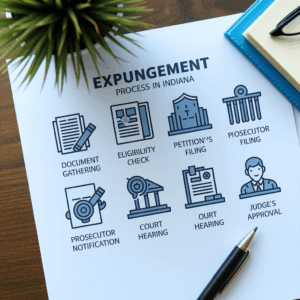Having a criminal record can affect your ability to get a job, secure housing, or even pursue higher education. Fortunately, Indiana law offers a second chance through a legal process known as “expungement” or sealing of criminal records. If you're looking to move forward with your life and clear your name, this guide will walk you through how to seal your criminal record in Indiana, step by step.

Understanding Expungement in Indiana
In Indiana, the legal term for sealing a criminal record is “expungement.” This process does not completely erase your record, but it does seal it from public view. This means that employers, landlords, and the general public will no longer have access to your criminal history through routine background checks. However, law enforcement and certain government agencies may still view expunged records under limited circumstances.
Who Is Eligible to Seal Their Record?
Not everyone qualifies for expungement, and eligibility depends on several factors including the type of offense, the time that has passed since the conviction, and your overall criminal history. Below is a general overview:
- Arrest Records: If you were arrested but not convicted, you may petition to expunge your record one year after the arrest.
- Misdemeanors: You may petition to expunge a misdemeanor conviction five years after the date of conviction.
- Class D/Level 6 Felonies: Eligible for expungement eight years after the conviction, provided it did not involve serious bodily injury.
- Other Felonies: May be expunged after eight to ten years, depending on the nature of the offense and whether it was reduced to a misdemeanor.
It's important to note that certain crimes, such as sex offenses, violent crimes, and official misconduct, are not eligible for expungement under Indiana law.
Step-by-Step Expungement Process
Sealing your criminal record in Indiana involves several legal steps. Here is a simplified breakdown:
Step 1: Gather Your Criminal History
Start by obtaining your criminal history from the Indiana State Police. This record will help you and your attorney determine your eligibility for expungement and identify which offenses are eligible.
Step 2: Determine Eligibility
Review your record to identify which convictions meet the criteria for expungement. It’s highly recommended to consult with a criminal defense attorney to ensure that you understand your rights and the complexities of your specific case.
Step 3: Prepare Your Petition
You’ll need to file a petition for expungement in the county where the conviction occurred. The petition must include specific details such as the offense, case number, date of conviction, and your reasoning for seeking expungement.
Step 4: Notify Prosecutors
Once the petition is filed, you are required to serve a copy to the local prosecutor’s office. In some cases, the prosecutor may object, especially if the eligibility criteria are in question.
Step 5: Attend the Hearing (if required)
While some expungement petitions may be granted without a hearing, others require a court appearance. During the hearing, a judge will review your petition and any objections raised by the prosecution before making a decision.
Step 6: Wait for the Judge’s Decision
If the judge grants your petition, the court will issue an order to seal your records. This order is then forwarded to the necessary agencies for processing. The timeframe for completion can vary but typically takes several weeks to months.

Benefits of Sealing Your Record
Successfully sealing your criminal record can open many doors that were previously closed. Here are some of the key benefits:
- Employment: You can legally state that you have not been convicted of a crime on most job applications.
- Housing: Landlords will no longer see sealed records in background checks.
- Education: Access to financial aid and college admissions may improve.
- Peace of Mind: You can move forward without the stigma of a public criminal record.
Common Mistakes to Avoid
The expungement process in Indiana is complex, and a single mistake can delay or even derail your petition. Here are some pitfalls to avoid:
- Filing Too Early: Filing before the required waiting period has expired will result in denial.
- Incomplete Petitions: Missing information or documents can lead to delays or dismissal.
- Multiple Counties: If you have convictions in more than one county, you must file petitions in all counties at the same time.
- Not Seeking Legal Help: Expungement laws are nuanced. Working with an experienced attorney increases your chances of success.
How an Attorney Can Help
Navigating the expungement process alone can be daunting. An experienced criminal defense attorney understands the legal requirements and local court procedures and can ensure that your petition is correctly prepared and filed. They can also advocate on your behalf during any required hearings, significantly improving your chances of a favorable outcome.
Ready to Seal Your Record?
If you're ready to take the next step in reclaiming your future, the Law Office of J.K. Sanchez is here to help. We understand how a past mistake can hold you back, and we’re committed to helping you put it behind you for good.
Contact us today to schedule a consultation and find out if you qualify to seal your criminal record in Indiana.



